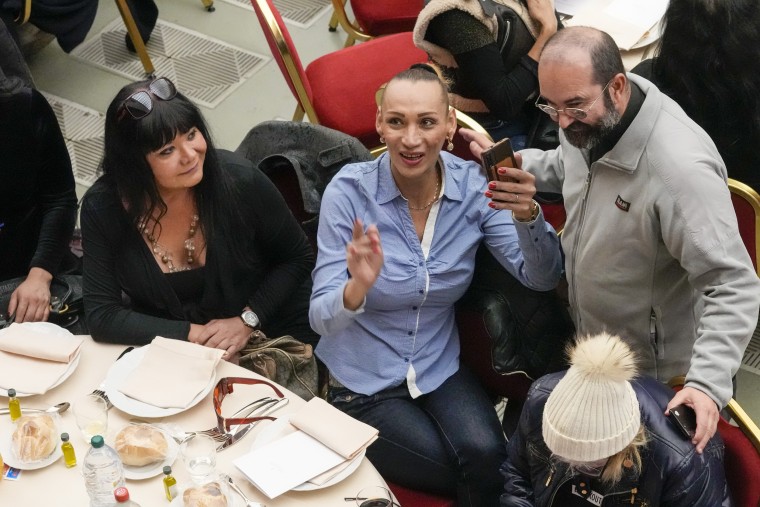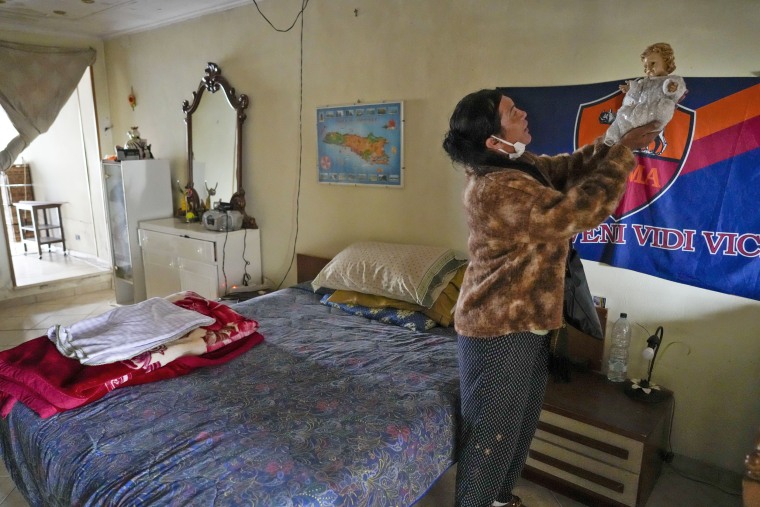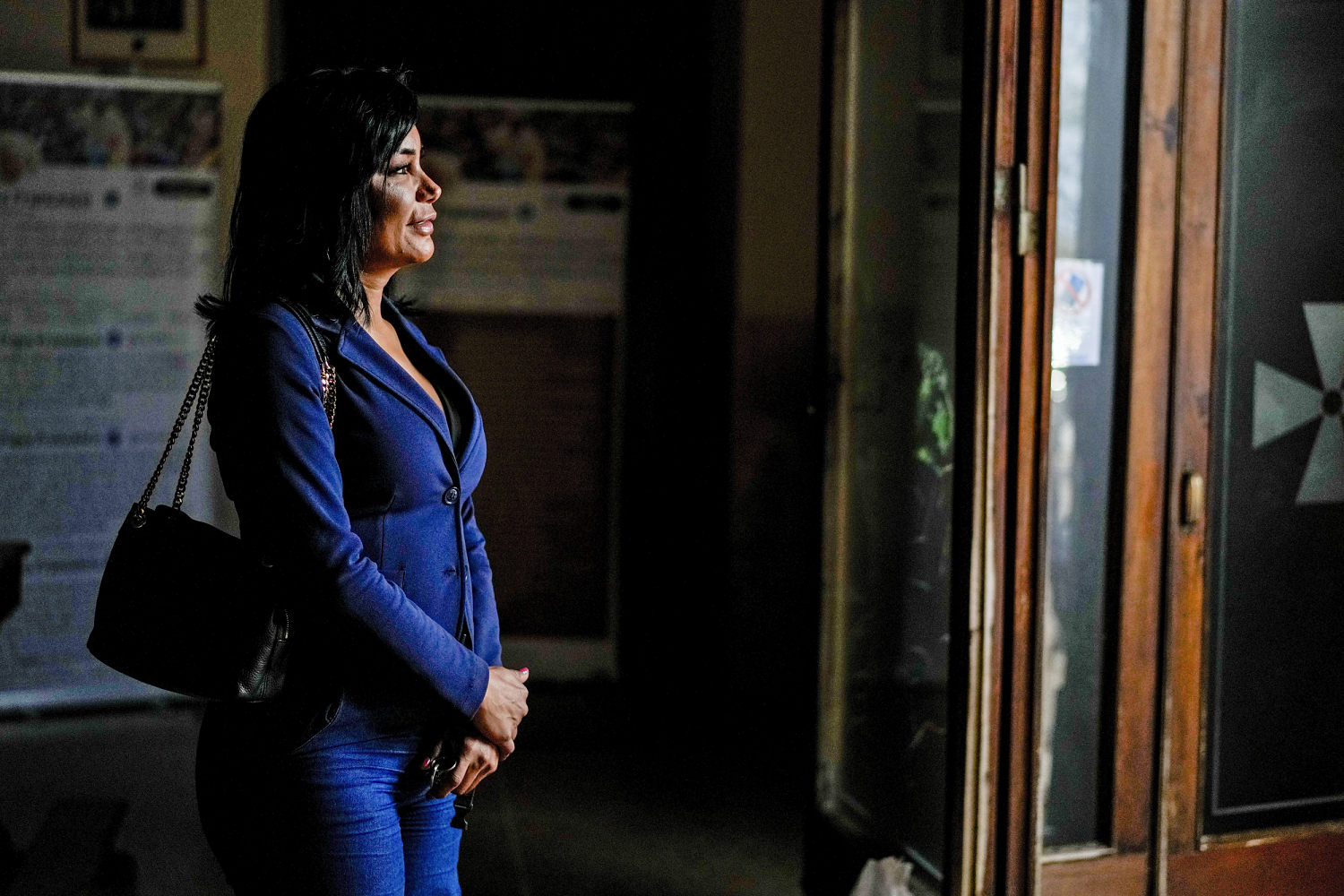TORVAIANICA, Italy — Pope Francis’ recent gesture of welcome for transgender Catholics has resonated strongly in this working class, seaside town south of Rome, where a community of trans women has found help and hope through a remarkable relationship with the pontiff forged during the darkest times of the pandemic.
Thanks to the local parish priest, these women now make monthly visits to Francis’ Wednesday general audiences, where they are given VIP seats. On any given day, they receive handouts of medicine, cash and shampoo. When Covid-19 struck, the Vatican bussed them into its health facility so they could be vaccinated ahead of most Italians.
On Sunday, the women — many of whom are Latin American migrants and work as prostitutes — joined over 1,000 other poor and homeless people in the Vatican auditorium as Francis’ guests for lunch to mark the Catholic Church’s World Day of the Poor.

The menu was evidence of Francis’ belief that those most on the margins must be treated with utmost dignity: cannelloni pasta filled with spinach and ricotta to start; meatballs in a tomato-basil sauce and cauliflower puree, and tiramisu with petit fours for dessert.
For the marginalized trans community of Torvaianica, it was just the latest gesture of inclusion from a pope who has made reaching out to the LGBTQ community a hallmark of his papacy, in word and deed.
“Before, the church was closed to us. They didn’t see us as normal people, they saw us as the devil,” said Andrea Paola Torres Lopez, a Colombian transgender woman known as Consuelo, whose kitchen is decorated with pictures of Jesus. “Then Pope Francis arrived and the doors of the church opened for us.”
Francis’ latest initiative was a document from the Vatican’s doctrine office asserting that, under some circumstances, transgender people can be baptized and can serve as godparents and witnesses in weddings. It followed another recent statement from the pope himself that suggested same-sex couples could receive church blessings.

In both cases, the new pronouncements reversed the absolute bans on transgender people serving as godparents issued by the Vatican doctrine office in 2015, and on same-sex blessings announced in 2021.
Prominent LGBTQ organizations have welcomed Francis’ message of inclusivity, given gay and transgender people have long felt ostracized and discriminated against by a church that officially teaches that homosexual acts are “intrinsically disordered.”
Starting from his famous “Who am I to judge” comment in 2013 about a purportedly gay priest, to his assertion in January that “being homosexual is not a crime,” Francis has evolved his position to increasingly make clear that everyone — “todos, todos, todos” — is a child of God, is loved by God and welcome in the church.
That judgment-free position is not necessarily shared by the rest of the Catholic Church. The recent Vatican gathering of bishops and laypeople, known as a synod, backed off language explicitly calling for welcoming LGBTQ+ Catholics. Conservative Catholics, including cardinals, have strongly questioned his approach.
After his latest statement about trans participation in church sacraments, GLAAD and DignityUSA said Francis’ tone of inclusion would send a message to political and cultural leaders to end their persecution, exclusion and discrimination against transgender people.
For the trans community in Torvaianica, it was a more personal message, a concrete sign that the pope knew them, had heard their stories and wanted to let them know that they were part of his church.
Carla Segovia, a 46-year-old Argentine sex worker, said for transgender women like herself, being a godparent is the closest thing she will ever get to having a child of her own. She said that the new norms made her feel more comfortable about maybe one day returning fully to the faith that she was baptized in but fell away from after coming out as trans.
“This norm from Pope Francis brings me closer to finding that absolute serenity,” she said, which she feels is necessary to be fully reconciled with the faith.
Claudia Vittoria Salas, a 55-year-old transgender tailor and house cleaner, said she had already served as a godparent to three of her nieces and nephews back home in Jujuy, in northern Argentina. She choked up as she recalled that her earnings from her former work as a prostitute put her godchildren through school.
“Being a godparent is a big responsibility, it’s taking the place of the mother or father, it’s not a game,” she said as her voice broke. “You have to choose the right people who will be responsible and capable, when the parents aren’t around, to send the kids to school and provide them with food and clothes.”
Source: | This article originally belongs to Nbcnews.com









